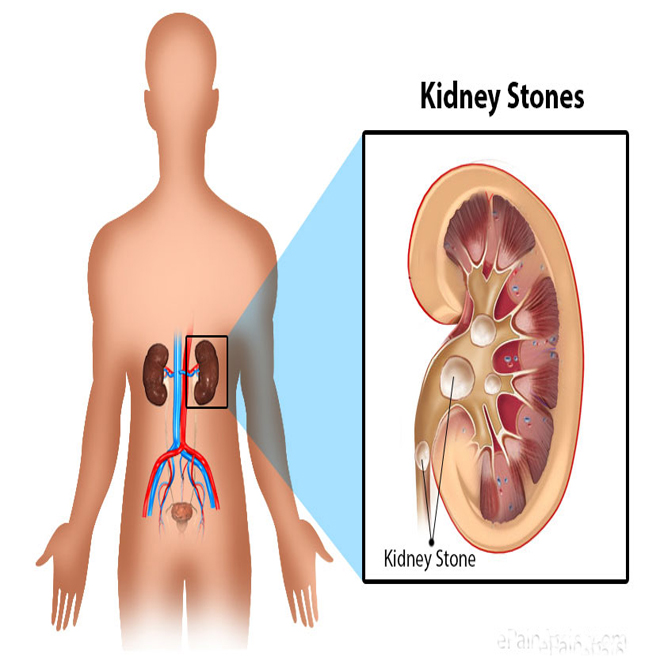Kidney Stone And Renal caliculi Homeopathy

Kidney stones often occur when urine becomes too concentrated. This causes calcium oxalate or other chemicals in your urine to form crystals on the inner surfaces of your kidneys. Over time these crystals may combine to form a small, hard mass. Sometimes this mass (stone) breaks off and passes into the ureter, one of the two thin tubes that carry urine from your kidneys to your bladder.
About 80 percent of stones are a combination of calcium and oxalate (oxalic acid), a substance found in many fruits, vegetables and grains. Most other stones are composed of uric acid, ammonia crystals.
Not all kidney stones cause symptoms, infact it is not unusual for stones to be discovered in the kidneys during X-rays for an unrelated problem. They may also be discovered when you seek medical care for blood in your urine, recurring urinary tract infections, or a vague pain or ache in your side – all common symptoms of kidney stones. It’s only when a stone breaks loose and begins to work its way down the ureter that the pain becomes agonizing.
Other investigations useful in determining the stone is ultra sound of abdomen and an IVP.
What are the symptoms of kidney stones?
Some people may not have any symptoms, but most have at least some, such as :
Severe pain in the kidneys or lower abdomen, which may move to the groin; pain may last for minutes or hours, followed by periods of relief
Nausea and vomiting
Burning and frequent urge to urinate
Fever, chills and weakness
Cloudy or foul-smelling urine
Blood in the urine
Blocked flow of urine.
The most common symptom is an intense, colicky pain that may fluctuate in intensity over a period of 5 to 15 minutes. The pain usually starts in your back or your side just below the edge of your ribs. As the stone moves down the ureter toward your bladder, the pain may radiate to your groin. If the stone stops moving, the pain may stop too .If a stone stays inside one of your kidneys, it usually doesn’t cause a problem unless it becomes so large that it blocks the flow of urine. This can cause pressure and pain. Over the years the stone could enlarge considerably affecting the kidney function and causing a portion of the kidney to be swollen or enlarged besides leading to an increase in blood pressure. They could even cause repeated episodes of severe pain and blood in the urine. Hence it is best to treat them when they are small and can be excreted through the urine.
Why do kidney stones form in some people and not others?
Normally, urine contains chemicals that prevent crystals from forming. However, these do not work for everyone. Factors that can contribute to stone formation in susceptible people include :
Too little fluid intake
Chronic urinary tract infections
Misuse of certain medications
Urinary tract blockage
Limited activity for several weeks
Certain genetic and metabolic diseases.